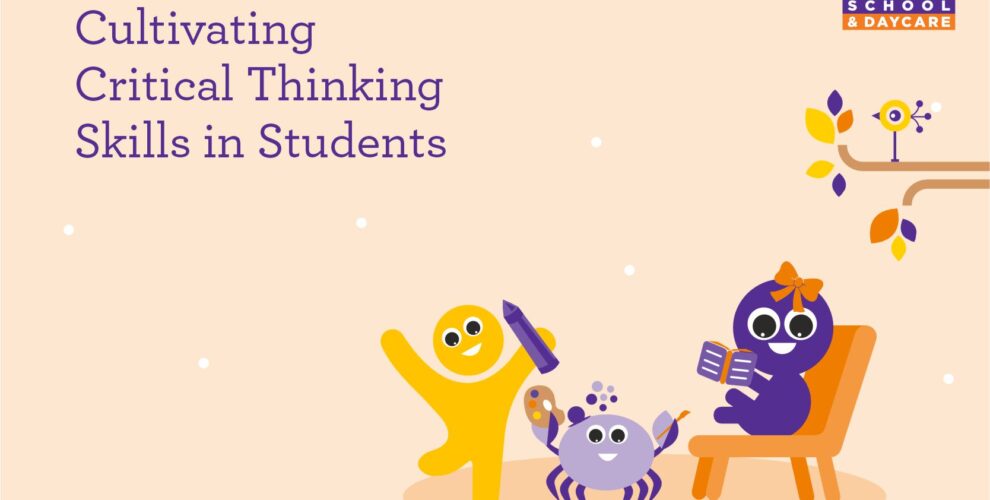In an ever-evolving world, critical thinking has become a fundamental skill that students need to succeed both academically and in their future careers. Critical thinking is the ability to analyze, evaluate, and synthesize information to make informed decisions and solve complex problems. Cultivating this skill in students is not only essential for their personal development but also for the betterment of society. In this blog, we will explore the importance of critical thinking skills and provide practical strategies for educators and parents to foster this valuable trait in students.
Why are Critical Thinking Skills Important?
Preparing for the Future:
In a rapidly changing world, rote memorization is no longer enough. Students need to think critically to adapt to new challenges and opportunities. Whether they enter the workforce or pursue higher education, the ability to analyze information, make reasoned decisions, and solve problems is invaluable.
Enhanced Problem Solving:
Critical thinking empowers students to dissect complex issues and develop innovative solutions. This skill is not only crucial in fields like science and technology but also in everyday life, from personal relationships to decision-making.
Effective Decision-Making:
Being a critical thinker means making decisions based on evidence and reasoning rather than emotions or biases. This leads to more informed and sound choices in all aspects of life.
Improved Communication:
Critical thinking skills enable students to express themselves clearly and persuasively. They can construct well-reasoned arguments and communicate their ideas effectively, both in writing and in speech.
Strategies to Cultivate Critical Thinking Skills
Encourage Questioning:
Create an environment where students feel comfortable asking questions. Encourage them to challenge assumptions and seek answers independently. This fosters curiosity and the habit of thinking critically.
Promote Active Learning:
Engage students in hands-on, experiential learning. This can include experiments, debates, case studies, and problem-solving exercises. Active learning encourages students to apply what they’ve learned in practical situations, fostering critical thinking.
Teach Problem-Solving:
Incorporate problem-solving activities into the curriculum. Encourage students to define problems, analyze potential solutions, and evaluate their effectiveness. Make sure they understand that there can be multiple ways to approach a problem.
Develop Information Literacy:
In the age of information overload, students need to be discerning consumers of information. Teach them how to evaluate sources for credibility, bias, and relevance. Encourage them to cross-reference information from different sources.
Foster Creativity:
Critical thinking and creativity often go hand in hand. Encourage students to think outside the box and explore unconventional solutions. Creative thinking can lead to innovative problem-solving.
Encourage Reflection:
Regularly ask students to reflect on what they’ve learned and how they’ve learned it. Discuss the process of critical thinking and decision-making. This self-awareness will help them improve their skills over time.
Socratic Questioning:
Use the Socratic method to stimulate critical thinking by asking open-ended questions that require students to analyze and justify their answers. This promotes deeper understanding and exploration of ideas.
Collaborative Learning:
Group projects and discussions can help students see issues from multiple perspectives. Encourage them to debate and collaborate, fostering empathy and an appreciation for different viewpoints.
Analyze Real-World Issues:
Connect classroom learning to real-world issues and current events. This can make critical thinking more relevant and help students see the practical applications of their skills.
Be Patient and Supportive:
Cultivating critical thinking skills takes time and practice. Be patient with students as they develop their abilities. Offer guidance and constructive feedback to help them refine their thinking.
Conclusion
Cultivating critical thinking skills in students is an investment in their future and the betterment of society. It equips them with the ability to navigate an increasingly complex world with confidence and competence. At Ipsaa School, we are committed to fostering an environment that encourages questioning, problem-solving, and independent thought, ultimately preparing students to be lifelong learners and critical thinkers.
Ipsaa School is the ideal institution to nurture critical thinking in your child. Through our innovative curriculum and dedicated educators, we provide an environment where students are encouraged to explore, question, and think critically. Whether through hands-on activities, thought-provoking discussions, or real-world applications of knowledge, Ipsaa School empowers our students to become adept critical thinkers.
To learn more about how Ipsaa School fosters critical thinking skills in students, and to explore our educational programs, please visit our website [insert website link]. Your child’s journey towards becoming a proficient critical thinker begins here.


Leave a Reply